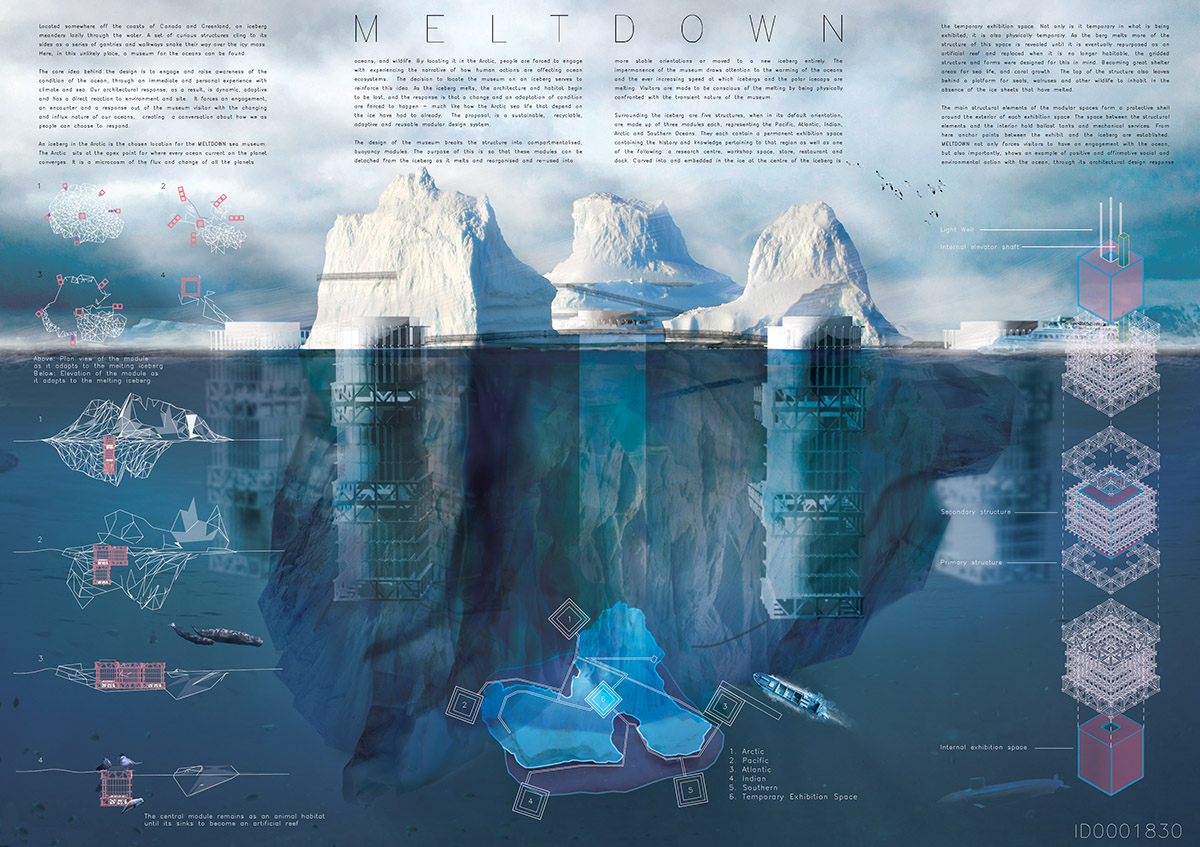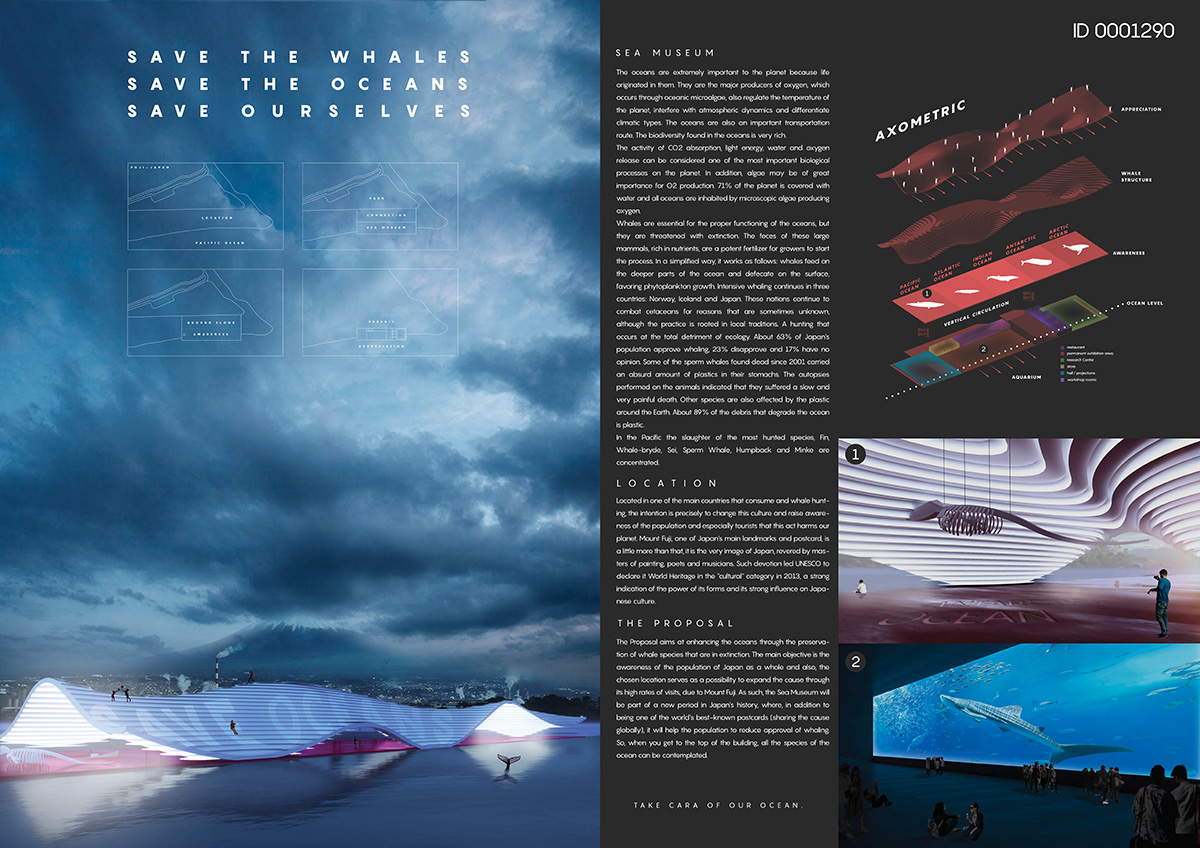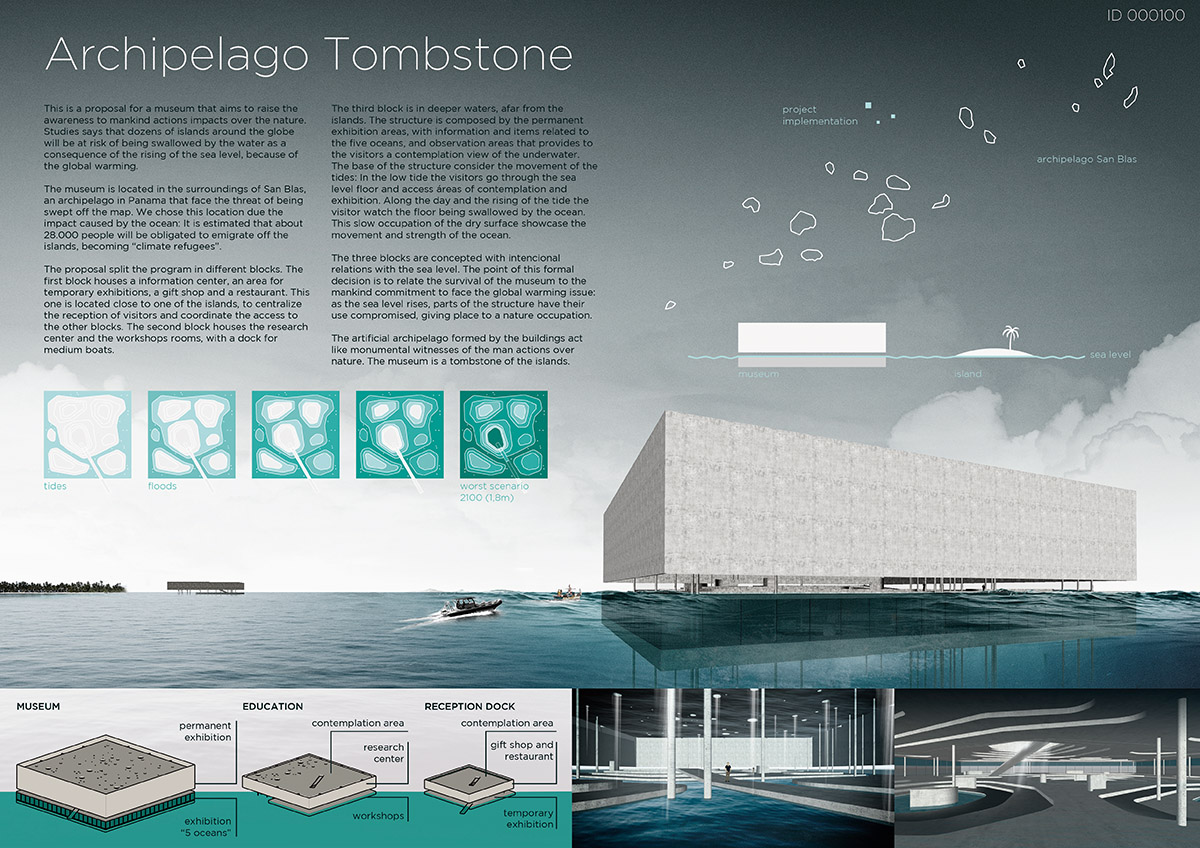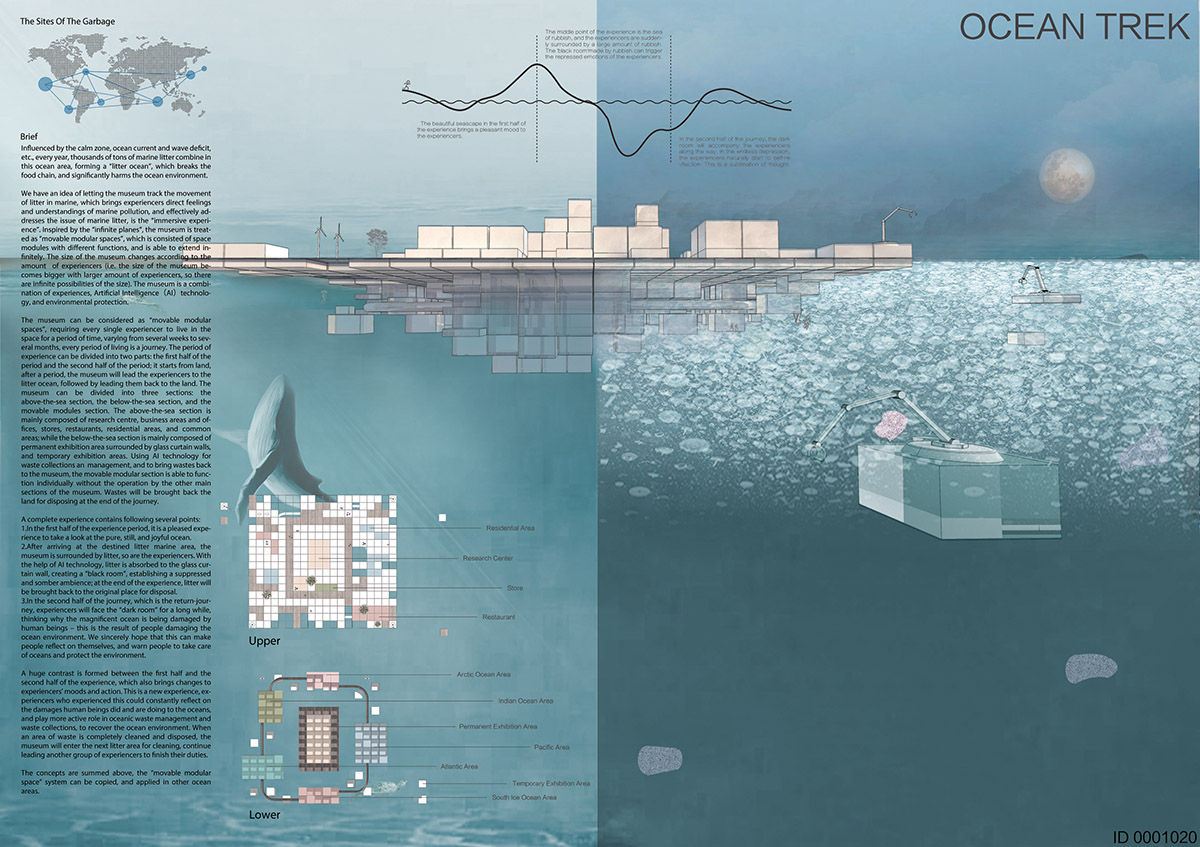Submitted by WA Contents
24H Competition Winners proposed new liveable spaces for Ocean Museums
Portugal Architecture News - Nov 06, 2018 - 01:00 25284 views

24H, a competition branch of ideas forward, has announced winners for its 26th edition of the competition, called "Ocean". The competition invited all designers and architects to design a Sea Museum, proposing a place of education and privileged information.
The international jury panel selected the first 3 winners from USA, Macedonia, Poland with 7 Honorable Mentions from Germany, China and Brazil, New Zealand, Brazil and more.
The most challenging part of the competition is that all participants should have designed and submitted their proposals in just 24 hours. The competition brief was very short and clear and the competition asked: "design a Sea Museum" and it said that regarding the objective of the competition: "As architects and active agents of society we have the important mission of designing the Sea Museum. We want it to be a point of awareness for the change of mentalities. Place of education and privileged information. Here, we can find all the information about the oceans, the new challenges, its importance for life."
The program of the competition included: 5 areas for 5 Oceans; (Pacific, Atlantic, Indian, Antarctic and Arctic) each area should privilege an ocean. 1 permanent exhibition area; (about the 5 oceans and its marine fauna and flora). 1 temporary exhibition area; (this exhibition should focus on pollution problems). Research Center; (for Ocean Studies and Research), workshop rooms; (for young people’s awareness), store, restaurant and other ares that they consider.
Participants were free to choose their location to adapt their project.
"The competition raises a topic, not only actual, but also of a great significance for the whole world and humanity," said jury member João Santa Rita.
"It is a way of promoting the discussion, encouraging not only statements, but also opening possible ways and strategies in order to call the attention to the ocean and men aggression towards its richness and resources - fauna and flora."
"The Ocean can look somehow apart from our lives, mainly for those who live far away from it, and far form achieving it, but is presence and existence will always be of an undoubtedly greater importance to the life of all Human Being," added João Santa Rita.
See all the winning projects with jury comments below:

1st prize: Anna Leshnick, Inbal Hazlett, Brooklyn, United States
"The project was found as much as realistic and feasible with a specific approach, touching the very basics of the problem, which is quite positive to progress for the future implementations. Another positive aspect of the approach is the transformation of the existing industrial structure. It has been transformed from its existing damaging condition into its awareness-raising level," said R.Güneş Gökçek.
"The proposal to install the Ocean Museum on an abandoned oil platform is very propitious, especially considering the future of these mega-structures scattered throughout the oceans, with the depletion of our oil reserves. In this sense, it is powerful concept that can be adopted in several places, constituting the possibility of an open and continuous work," said João Sodré.
"Hosting Island is an innovative proposal that deploys the Ocean Museum on an offshore oil platform. Located in the Gulf of Mexico, the project potentiates a new tourism option and transforms an environmental problem into a support structure for preservation and education," said Pedro Tuma.
"The projects exploits the reuse of former oil platforms and infrastructure, building a kind of maritime structure, as an architectonic situation, to host the museum and its different facilities. The object that once was a cause of pollution, works as the support for a new vision towards the Ocean, its resources and importance concerning the well being of Men," said João Santa Rita.
"The most significant of this proposal is the programmatic approach of a museum supported by a sustainable system. Its mu§tant character, which over time allows itself to be appropriated by the oceans allows it to be differentiated and singular. A balanced and intuitive response," said Pedro Novo.

2nd prize: Valbona Fejza, Adelina Fejza, Sanja Avramoska, Brankica Dogazanska, Skopje, Macedonia
"In a relatively untouched area, the proposal is offering an interesting mass effect with its simple linear form. While the linear mass elevated form the ground, permanent exhibition spaces are being buried in the earth. Thus, the building can be used in different usage scenarios at the same time. Linear form is providing to its visitors beautiful panoramic vistas in two directions. Despite these positive characteristics, the elevator relationship with the sea has been found to be weak," said R.Güneş Gökçek.
"The choice of the site for the implantation of the museum is, by itself, extraordinary. The project, however, used two complementary operations to imagine the space: the subtraction of the ground floor to accommodate the spaces dedicated to the oceans and the addition of another layer, built and aerial, to shelter the other parts of the program," said João Sodré.
"The Touch penetrates the landscape delicately and accurately. It counterposes the subtraction of the earth to implant the volume of expositions to the addition of the straight line to house the other programs of the Museum. An interesting reference for the terrestrial and maritime flows of the Algarve," said Pedro Tuma.
"The project, combines the sea, the earth and Man intervention - nature and construction. It combines the platform, that stands on top of the cliff, the cliff itself and the ocean, in a powerful historic coast and context. The Museum embraces de cliff as a kind of Landmark and Tower Light, that floats over the sculptured site - a sequence of carved oceans," said João Santa Rita.
"The most unique in this proposal is its escape from the obvious! The representation of the oceans on land allows you to map these "new" sites in a secure and controlled system for the visitor. We are facing a proposal away from utopia, which gives it an aggregating power of an imaginary near the most differentiated museums," said Pedro Novo.

3rd prize: Katarzyna Przybyła, Agnieszka Wierzbicka, Wrocław, Poland
"In this proposal, bringing the structure of the museum to the center of the city, where the source of the garbage started, and the way it putting the problem to a wider community / consumers brings the project to an important point. Generally speaking, awareness of the modules that form the building walls by producing plastic bottles collected from the sea plays an important role in the project. The easy exhibition-information method created by the screens and making data-base accessible can be defined as the breaking point of the project," said R.Güneş Gökçek.
"This project is an important reflection on an urgent problem for the maintenance of the oceans ecosystem, using a powerful appropriation of plastic waste. Its versatility and universality allow its installation in several cities simultaneously, which makes us think about the possibility of a network's project," said João Sodré.
"O-Museum. It goes against the grain of the architectural longings that use the solidity of the building as a support. With a simple action, it is capable of organizing various actions, enhancing the existing environment of the cities in which it operates. Can be deployed in many places, reflecting contemporary intangibility," said Pedro Tuma.
"The project stresses the power of communication through collected information. It deals with senses mainly the vision. Dealing with ordinary supports such as large screens, and totems, it creates public landmarks in strategic public spaces calling attention of a maximum number of citizens and visitors. The remarkable caracter of the proposal lyes on its almost non use of “design” in favor of a communication system," said João Santa Rita.
"Never did the "message in the bottle" music of "The Police" make so much sense in an architectural competition !! The ability to communicate and to pass on messages is fundamental in a world far from reality. Probably the most consistent proposal at a conceptual level that has been able to completely reverse the concept for project material," said Pedro Novo.

Honorable Mention: Benedikt Hartl, Munich, Germany

Honorable Mention: Zhi Wang, Jing Wang, Junchi Fang, Yumeng Yan, Beijing, China

Honorable Mention: Kenny Leung, Patrick Holland, Wellington, New Zealand

Honorable Mention: Gustavo Pessini, Gabriel Silveira, Santa Maria, Brazil

Honorable Mention: Mateus Henrique Hillebrand, Ananda Rossi da Motta, Bruno Augusto Lorenz, Isaque Davi Schafer, Nova Hartz, Brazil

Honorable Mention: 其权陈, 倚铃彭, 誉杰张, 鸿斌冯, Guagnzhou, China

Honorable Mention: Elena Florea, Ruxandra Vasile, Anamaria Preotesoiu, Robert Stoicescu, Oana Brînzei, Bucharest, Romania
The international jury composed of R. Güneş Gökçek, founder of rgg Architects, João Sodré, professor at Armando Álvares Penteado Foundation (FAAP) and São Judas Tadeu University (USJT), both in São Paulo, and Pedro Tuma, director of Terra e Tuma Arquitetos Associados in São Paulo, Brazil, João Santa Rita and Pedro Novo.
World Architecture Community is Media Partner for 24H competitions and you can register to 24H's next competition "Knowledge". Regular registration period ends up on November 7, 2018.
24H competition, founded and led by Hugo Ferraz, who is also Country Reporter of World Architecture Community for Portugal.
All images courtesy of ideas forward
> via ideas forward
